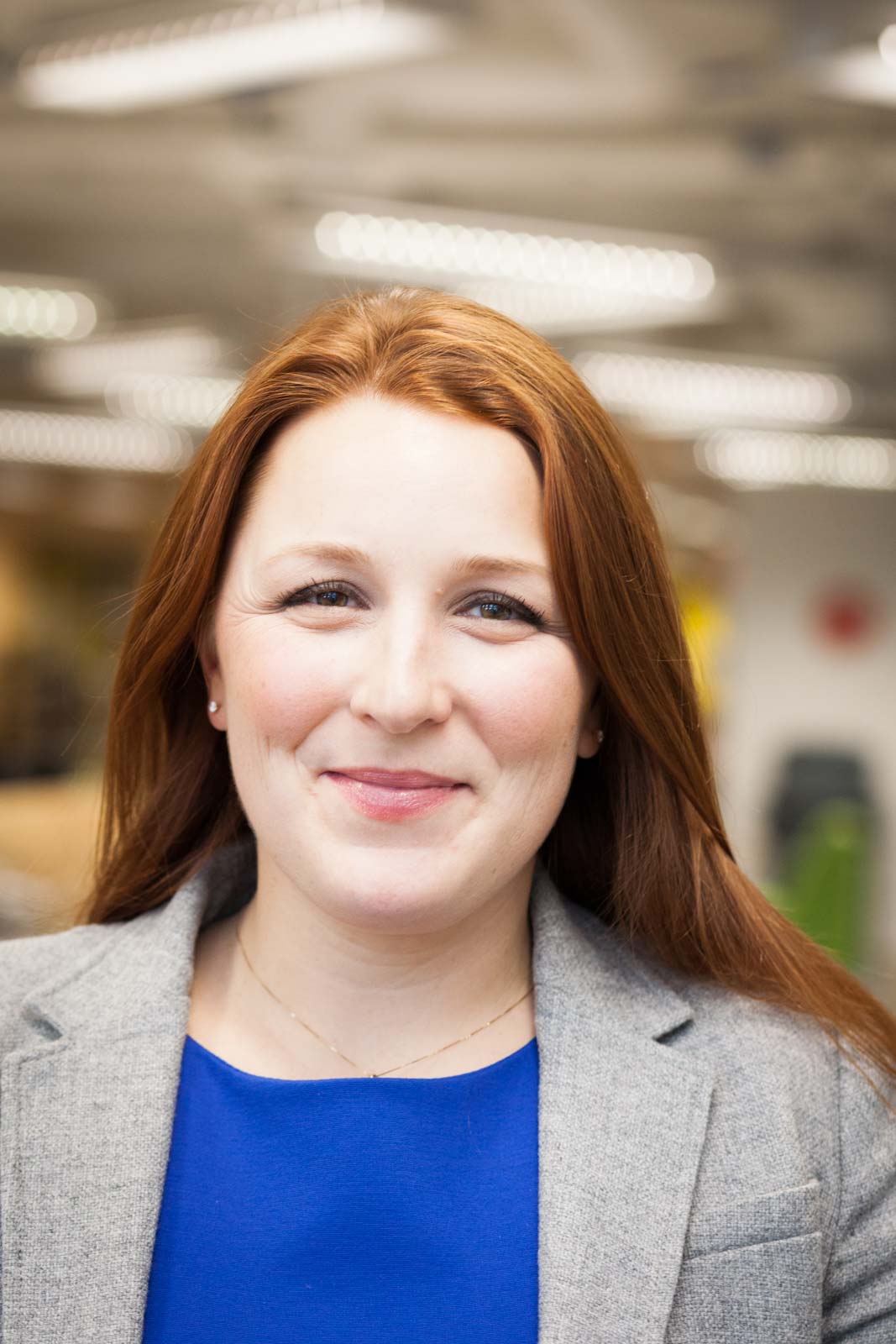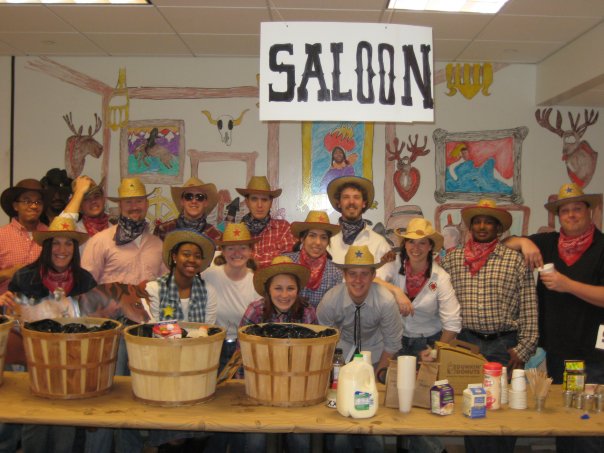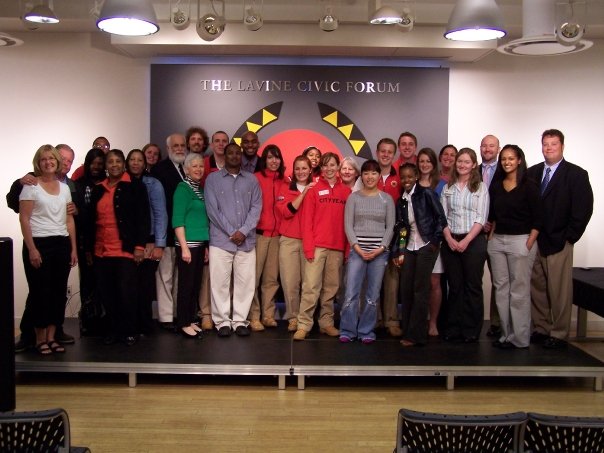Care Force Alumni Spotlight: Amy Rencher

Karli, Eric, Molly and I were very thankful for Amy taking time out of her busy schedule to speak with us on Zoom. We spoke about Amy’s past experiences as part of City Year, about her time on Team Care Force, about her current job and how that has been affected by COVID-19.
Avery: Where did you serve and what is your favorite memory from your first AmeriCorps year?
Amy: My first AmeriCorps year I served in Detroit. I was a service leader; I don’t even know the name of this anymore so this might be dating me, but I was a Service Leader which was a senior corps position. I served as a senior corps member my first year where I oversaw my team of eight corps members at Roberto Clemente learning academy in southwest Detroit. Southwest Detroit is a network of communities that is almost exclusively Hispanic or Latin X individuals. It is a world within a world. As you probably know Detroit is a primarily black city and it’s like you step into a whole new network of culture and people and its pretty cool. It’s a pretty lively exciting culturally rich place. I really enjoyed my time there that was my first service year in Detroit.
So, we had these buses. It’s Detroit (aka Motorcity) so unfortunately, we don’t have any really great public transportation, and when I served it was even worse than it is now. So, the service leaders drove passenger vans, 15-person passenger vans. Everyone met at the City Year office which is consequently literally across the street from where I work now, we met there early in the morning and did training and then drove people. I had to get my chauffer’s license, technically to drive more than 15 people you have to have your chauffeurs license. But the memories of driving in the van, to school and back from school, were just off the wall conversations and we ate a lot of goldfish cause at the time that company (Pepperidge Farm) was a huge supporter of City Year so there were goldfish everywhere. I probably ate goldfish for a meal several times a week. But my memories driving my team around in the van, those were pretty fun.
Karli: What was your favorite Care Force trip and why?
Amy: What number TCF is their now?
Avery: 14
Amy: I’m pretty sure we were year two. So, you know what was really cool? Technically this was event before my Care Force year so maybe this was their way of screening me without me really knowing but when I was still a service member in Detroit, I had the opportunity to go to Guadalajara. We had an event with Pepsi Co. and the Gatorade headquarters is in Guadalajara. That was pretty incredible, it was very different than any other service event. We did work at an orphanage, dirt floors, the kids played in dirt. We did landscaping and painting and murals and stuff like that. That experience was pretty incredible, super wonderful caring people from Gatorade that gave a whole lot of time, energy and spirit in that project to kids that were really full of life and living in really difficult circumstances. That was a pretty great and set an uplifting tone for me going into my Care Force year. That was my serious answer that not many people had the opportunity to do.
I would not do my team justice if I did not point to a super fun memory that they were all on the trip for. We went to Chattanooga Tennessee and we stayed in trains. There’s a hotel (The Chattanooga Choo Choo) that they made out of this old train yard and we stayed in trains. It was a super random and super fun like everything is with Care Force. Just a whole series of random circumstances.

Eric: What is your current position and what are your job responsibilities?
Amy: I am the Managing Director of Entrepreneurial Program and Services at Tech Town Detroit. Tech Town Detroit is the city’s most established business incubator and accelerator. We also own and operate 130,000 square foot building that serves as a coworking, conferencing and event center. This is our 16th year. To both early stage small business and tech entrepreneurs, we provide coaching, curriculum-based programing and subject matter expert services to help them grow, sustain and scale their businesses. We serve roughly 500 entrepreneurs a year. We help people access capital for the first time. We help them prepare to access capital. We help them hire for the first time, prepare to hire, diversify revenue streams, and launch their business. We have a business accelerator specifically for launching your business in the city of Detroit in a brick and mortar space. On the tech side we do really cool stuff. There are tech enabled companies that we work with, one is from Wayne State University. There is a student duo that were clients of ours that developed technology from honey to speed up wound care. I forget the exact turn around but this honey solution they came up with speeds up the recovery of a significant wound by a matter of days. There is another more recent client that developed an app with the city of Detroit so that a non-commercial business, a resident, can monitor their water bill in almost real time. So, a pretty wide spectrum of businesses we serve; the traditional small business type, mom and pop businesses, hair salons, shoes stores, coffee shops, restaurants, and our work over the past couple years has been about merging those two worlds together. How we leverage systems and technology to keep brick and mortar small businesses competitive. Tech Town was kind of ahead of the curve when COVID began in that because some places are not online or not finding some way to leverage technology to sell small businesses, and they are having a really hard time. So, it’s an exciting time, but a very difficult time for many whom we serve. For some we are really helping keep their livelihood in place through COVID and others found ways to use this opportunity to grow their business. So, both ends of the spectrum. Really helping some people to sustain and we were able to help others to grow in scale.
Avery: What skills did you develop with TCF that you think are most relevant to your current work?
Amy: So many, a lot of it is the leadership. I am really due to tell Wil this himself, because it was a really hard go with Wil and I to get started. Wil helped start the department and was a really integral person to corps member development. He instilled just the right amount of discipline and familial direction that I think a lot of us misfits needed at that stage in our lives. And Ted equally, indirectly provided a whole lot of direction for me. I oversee 25 people at this point, and they helped me think a lot about how to manage people in the right way. For all that City Year says about certain leadership, they really live it. When you get out into the real world not everybody lives that even though it’s become like the catch phrase now. A lot about of what I learned about managing people in the right way; embracing their humanity, giving grace, and allowing people to shine through and identify the best that they have. That I learned with Care Force and with City Year. I owe Will and Ted that.
Karli: What piece of advice do you have for future TCF members?
Amy: It’s all about the team. You live and die by the team, and by no means were TCF 2 perfect and have this amazing crew. There were all kinds of trials and tribulations along the way but when you find out that you’re stuck with those people for a year, often in confined spaces like hotel rooms, service sites and airplanes you find a way to work past to get to honesty and to get to people and figure out how you all work together as a team.

Eric: What was a major learning moment you had while serving on Team Care Force?
Amy: First is the funny answer. You guys don’t really know Wil, but one of the things he was dead set on when teaching the many things that he taught us was teaching the W pattern when you paint. I just thought this was the most ridiculous thing. This dude has the biggest ego. His name is Wil and he is telling everyone to paint in the W pattern. But it is a thing, it wasn’t just his ego and I have painted in the W pattern I will say since then to great efficiency. So that’s my funny answer, but the biggest takeaway I think, like a like a lot of parts of City Year as an organization, the work specifically in Care Force is service to communities, but also in partnership with corporate volunteers, it brings out the best in people. I think the times that I saw our team members shine on service days were pretty incredible. I think it was just really cool to be a part of that magic. I think we did 13 events my year. At least I did, everybody kind of had a different number. I did 13 events and every single one was like magic, every single one and that is hard to do. Actually, it’s really hard to execute on that skill level with pride, compassion, excellence and with acknowledging each volunteer where they’re at in their physical abilities. I’m sure you know that we have folks that have different levels of abilities and that that magic isn’t lost on me. It’s that’s not easy to replicate. There’s a secret sauce to people, systems, mission and dedication to that mission that makes those events successful the way that they are.
Avery: In what ways have you engaged with Care Force or City Year as an alumni?
Amy: I was a National Alumni advisory board member. When I still lived in Boston, I was on the city of Boston alumni board, even though I’ve never technically served the city of Boston, but TCF didn’t have one, so I co-chaired that board. When I moved back to Michigan and when I first moved back to the city to Detroit, I either chaired or co-chaired our alumni board and was a National Advisory Board member. I’ve been an associate board member for around a year and a half, I think at this point, if I’m not mistaken. They’re actually about to move offices, but for the last five years that I’ve worked in the city, the City Year office is literally directly across the street. I often ran into colleagues just out about in the city and was always pleased to see corps members. I always kind of like cringe after I’d say hey, when you see someone in a jacket and you get so excited, but then realize they don’t know me. They don’t care. This creepy person off the street, saying hi, but I was happy that I could still have those moments and see red jackets and feel connected in that way.
Karli: How has COVID-19 altered your current role and how are you adapting?
Amy: A lot, this has been a really hard year. I lead programming for small businesses in the city. I’m sure you all have an understanding that small businesses, have just been hurt incredibly, by COVID. My organization serves the smallest of the small typically, so micro-enterprises. I’ve been saying mom and pop neighbor businesses, but these are businesses with, five employees or less, typically. In Detroit, I think the number one COVID hit was that a typical small business in Detroit had two weeks of cash, and then they were done. Businesses at the smallest, sort of mom and pop level, don’t have a lot of cash reserves. In the corporate, or even larger small business you’d have months or years reserve. Then an organization like the nonprofit I work for has a couple hundred thousand dollar reserve. So, when COVID hit, it just knocked everyone out completely. There’s still not a good understanding of how many businesses have permanently closed in the city and even nationally. Then when you think about Detroit being a majority black city, we’ve just been decimated. Black entrepreneurs are faced many challenges. The access to capital is the big one that I’ve mentioned earlier, but there’s many systemic ways in which they’ve been disadvantaged. This just kind of knocked that segment of entrepreneurs, five more steps back.
There’s been a whole lot of activity, I’ve been at the helm of a public/private partnership called the Detroit Means Business. I’m an advisory board member For Detroit Means Business, it’s a 40 plus public/private partnership coalition that we established in May, when we were just reopening businesses, the first time. We had an executive order here from our governor, that essentially completely shut down businesses for about two and a half months. We organized that in May, around creating a sort of coordinated reopening strategy. The cool part about this coalition is that it’s public, private, and civic, so the city’s involved in work as well. It’s really hard to get all of those players at the table at the same time. It came together at a really hard time to help support entrepreneurship, but I’m five years into this work in the city, I’ve never seen this many partners at the table from public, private and the city come together. To really convene and get out of the ego and come together to do good work. It’s about leveraging and organizing resources. There are just so many people that are impacted across the nation that no one’s going to swoop in and save everybody by writing a check. It’s not going to happen. That means a whole bunch of people need to pool monetary resources but also people and whatever else they can to come together to help support this really critical time for small businesses in our country. So that’s been a light at the tunnel through all this, is being part of that pretty incredible initiative and being at the advisory at the stakeholder level, to help shape that.
Eric: What are some activities that you have started during the pandemic or skills you think you have improved on since working from home?
Amy: My husband and I did puzzles for a hot minute, but then I just completely fell off the puzzle wagon. We were doing really good with cooking, then kind of fell off that also. The one thing that we’ve done pretty consistently, which is cool is that my husband and I get up really early in the morning and walk. Usually it’s about five miles in the morning. It’s just the two of us together before work starts, and it’s kind of cool because our work is sometimes connected. It’s more frequently connected now that I have more touch point to the city. He’s the housing director for the City of Detroit. So sometimes we get our game faces on for the day, we talk strategy as we do our thing. So that’s fun, it’s a special time. We’re both pretty busy people so I really appreciate the time with him.
Got to shout out my team Hugh, Alice, Allison, Tom, Mary, David and Joel!
This conversation took place on 10/20/20.
Related stories
Team Care Force member Andy Wilson shares some of his favorite things about traveling with Team Care Force.
Read more about My favorite things about traveling with Care ForceCare Force is proud to welcome seven new senior AmeriCorps members serving as project leaders on Team Care Force.
Read more about Welcome Team Care Force #16Team Care Force ventures to East Palo Alto, California, in their yellow City Year jackets to prep and lead a...
Read more about Emerson Collective at EPA BloomhouseIn October 2021, Noel Wuesthoff led Aramark volunteers in his first ever in-person event in Dallas and again a few...
Read more about Aramark Unites Against Poverty















